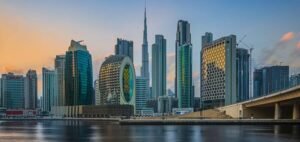From Oil to Opportunity
The Arabian business landscape has long been synonymous with the oil and gas industry, with vast reserves of hydrocarbons driving economic growth and prosperity in the region. However, in recent years, Arabian countries have embarked on ambitious diversification efforts aimed at reducing dependence on oil revenues and building more resilient and sustainable economies.
In this article, we explore the shift from oil to opportunity in the Arabian business landscape, highlighting the strategies, challenges, and opportunities associated with economic diversification.
Strategies for Economic Diversification
Arabian countries have adopted various strategies to diversify their economies away from oil dependence. These strategies often include investing in non-oil sectors such as tourism, manufacturing, technology, finance, and renewable energy.
By diversifying their economic base, Arabian countries aim to reduce vulnerability to oil price fluctuations and create new sources of growth and employment.
Investing in Infrastructure and Innovation
Infrastructure development and innovation play a crucial role in economic diversification efforts. Arabian countries are investing heavily in building modern infrastructure, including transportation networks, logistics hubs, and smart cities, to support the growth of non-oil sectors.
Additionally, governments are promoting innovation and entrepreneurship through investment in research and development, technology parks, and startup incubators.
Promoting Foreign Investment and Trade
Arabian countries are actively seeking foreign investment and promoting trade to diversify their economies. By creating business-friendly environments, implementing regulatory reforms, and offering incentives to investors, Arabian countries attract foreign capital and expertise in key sectors such as manufacturing, finance, and technology.
Trade agreements and partnerships with other countries further enhance economic diversification by expanding market access and facilitating the exchange of goods and services.
Developing Human Capital and Skills
Human capital development is essential for economic diversification and sustainable growth. Arabian countries are investing in education, vocational training, and skills development to equip their workforce with the knowledge and expertise needed to thrive in non-oil sectors.
By prioritizing education and training programs that align with the needs of emerging industries, Arabian countries ensure that their citizens are well-equipped to participate in and contribute to the diversification process.
Fostering Innovation Ecosystems
Innovation ecosystems are critical for driving economic diversification and fostering entrepreneurship. Arabian countries are establishing innovation hubs, technology clusters, and research centers to nurture a culture of innovation and entrepreneurship.
These ecosystems bring together startups, investors, researchers, and policymakers, creating synergies and opportunities for collaboration that drive technological advancement and economic diversification.
Addressing Environmental Sustainability
Economic diversification efforts in Arabian businesses are increasingly focused on environmental sustainability. Arabian countries are investing in renewable energy, sustainable agriculture, and environmental conservation initiatives to mitigate the environmental impact of economic activities and promote long-term sustainability.
By embracing green technologies and practices, Arabian countries position themselves as leaders in the transition to a low-carbon economy.
Promotion of Tourism and Hospitality
Arabian countries are leveraging their rich cultural heritage, natural landscapes, and strategic location to promote tourism and hospitality as key drivers of economic diversification. Investments in tourism infrastructure, including hotels, resorts, theme parks, and cultural attractions, attract visitors from around the world and stimulate growth in related sectors such as transportation, retail, and entertainment. By positioning themselves as premier tourist destinations, Arabian countries create new revenue streams and employment opportunities beyond the oil sector.
Expansion of the Financial Services Sector
The financial services sector plays a vital role in economic diversification, serving as a catalyst for investment, trade, and innovation. Arabian countries are developing their financial markets, including stock exchanges, banking systems, and regulatory frameworks, to attract domestic and international investment.
Additionally, initiatives such as Islamic finance and fintech innovation hubs contribute to the growth and sophistication of the financial services sector, diversifying the economy and enhancing its resilience to external shocks.
Promotion of Knowledge-Based Industries
Knowledge-based industries, including information technology, telecommunications, and digital services, are emerging as key drivers of economic diversification in the Arabian business landscape.
Arabian countries are investing in digital infrastructure, broadband connectivity, and e-government initiatives to promote the growth of the digital economy.
By fostering innovation, entrepreneurship, and digital skills development, Arabian countries create opportunities for knowledge-intensive industries to thrive and contribute to economic growth and competitiveness.
Investment in Renewable Energy and Sustainability
Arabian countries are harnessing their abundant renewable energy resources, including solar, wind, and hydroelectric power, to diversify their energy mix and reduce dependence on fossil fuels. Large-scale renewable energy projects, such as solar parks and wind farms, contribute to energy security, environmental sustainability, and economic diversification.
Additionally, investments in sustainability initiatives, including water conservation, waste management, and eco-friendly practices, demonstrate a commitment to long-term sustainability and resilience in the face of global challenges such as climate change.
Promotion of Small and Medium Enterprises (SMEs)
Small and medium enterprises (SMEs) play a vital role in economic diversification by driving innovation, creating jobs, and fostering economic resilience. Arabian countries are implementing policies and programs to support the growth and development of SMEs, including access to finance, business incubation, and market access initiatives.
By empowering SMEs to thrive in diverse sectors such as manufacturing, services, and technology, Arabian countries strengthen the foundations of their economies and promote inclusive growth and prosperity.
Read more: US Fintech Company MoneyHash Explores Opportunities in Saudi Arabia’s Growing Market




